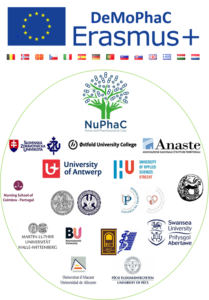Duration of the project:
1.9.2018 – 31.8.2021
Lead Partner:
University of Antwerpen, Belgium
Collaborating parties / partners:
University of Primorska, Faculty of Health Sciences, Slovenia
Swansea University, United Kingdom
Martin Luther University Halle Wittenberg, Germany
Charles University, Czech Republic
ANASTE, Italy
University of Applied Sciences Utrecht, Netherlands
Inland Norway University of Applied Sciences, Norway
Slovak Medical University, Slovakia
Clement of Ohrid University of Bitola, FYROM
University of Peloponnese, Greece
University of Alicante, Spain
University of Pecs, Hungary
Public Nursing School of Coimbra, Portugal
Team at UP Faculty of Health Sciences:
Assist. Prof. Mirko Prosen, PhD (SICRIS, ResearchGate)
Assist. Prof. Sabina Ličen, PhD (SICRIS, ResearchGate)
Assist. Prof. Igor Karnjuš, PhD (SICRIS, ResearchGate)
Content:
Nurses’ role in interprofessional pharmaceutical care (PC) is not transparent and varies between European countries. Similarly, in nurse education, a clear description of specific learning outcomes on PC is lacking in most European countries and curricula in PC vary a lot. Furthermore, the match with the needs of the labour market and society is insufficient. The lack of transparency and recognition, combined with the variation between countries, in nursing practice and nurse education, has a major impact. It hinders collaboration on different levels: 1) quality of interprofessional collaboration in daily clinical practice; 2) transnational collaboration in research, education and innovation in Europe; 3) labour mobility of nurse students and nurses. Our GOAL is to strive for more transparency & equality for the EU-nurse in PC and to build strong connections between research, education, practice and policy. Our focus is on PC as a crucial part of therapy in most patients. With a major impact on care quality and patient safety preliminary analysis of EUPRON data of 3300 nurses/doctors/pharmacists showed nearly all participants are convinced of the positive impact on care quality of increased nurse involvement in PC. Interprofessional communication in PC scored 5,2/10, an alarming score given the link with patient safety.
Project objectives:
- to develop a model for nurses’ role in interprofessional PC, a framework for collaboration in PC on the different levels aforementioned, based on the needs and context of the labour market and society.
- to specify and validate learning outcomes for nurse education in pharmaceutical care, which meet the learning needs of students, matched to the labour market and societal needs.
- to develop an assessment to evaluate competences in PC, as a guidance to evaluate nurse education, as a tool for nurse educators, for benchmarking, and nurse labour mobility.
- to create/strengthen an international network for PC in nursing, to collaborate on nurse education, research, practice and policy.
- A strong involvement of students, learning on research, education and policy in Europe. The partners’ strong connections are an excellent opportunity for students.
- to describe nurses’ role, nurse education and student nurses’ competences in interprofessional PC in the European partner countries, necessary to reach objectives 1-3, and allowing benchmarking, a clarification of differences and similarities, essential for international collaboration.

Framework for the role and education of nurses in interprofessional pharmaceutical care.
In December 2021 our DeMoPhaC project finished. The project was financially supported by ‘Erasmus+’ and ‘Consensus/ MDMJ’ and executed in a consortium of partners from 14 different European countries. We want to thank all that have contributed to this project! Thank you!
The project allowed us to develop the NuPhaC-EU framework. The framework creates transparency in nurses’ role in interprofessional pharmaceutical care. In clinical practice it can be used to discuss, evaluate and optimize nurses’ responsibilities and tasks in pharmaceutical care, taking into account the contextual factors, aiming for high quality, efficient care. For researchers, the framework can help to position projects and innovations in interprofessional pharmaceutical care and evaluate options for international valorisation. For nurse education, the NuPhaC-EU framework was translated to the competences required for nurses to take up the responsibilities and tasks. Providers of nurse education can use these competences, linked to specific responsibilities and tasks expected by the labour market, to evaluate and optimize their curricula. A nurse pharmaceutical care assessment was developed and is available in different languages. Upon completion of the assessement, participants can benchmark their results with others.
Are you interested? Would you like to learn more about the results or would you like to use them? We love to hear about it. In the short summary at the end of this email, you can find the links to all publications and the project websites. In the meantime, we have already started making new plans to further refine the tools, to extend the possibilities and to support the implementation. Through the NuPhaC website (www.nuphac.eu) we will keep you up to date.


